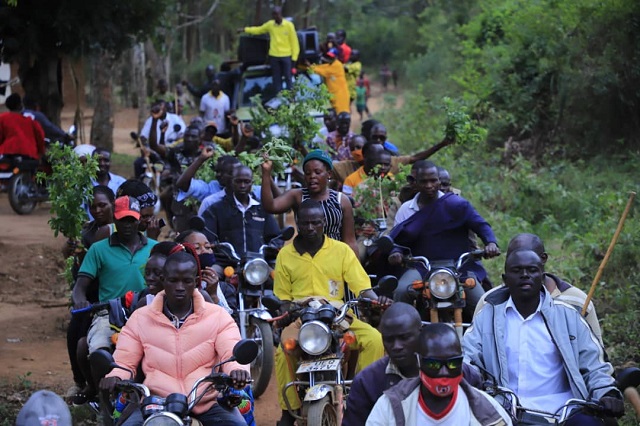
There is a moral issue as well. What is the profile of most voters in this particular constituency? The fact that they accepted cash handouts for their vote suggests that they are likely to be very poor. It is possible many of them have one meal a day, or two poor quality meals a day; many live in houses with rammed earth floor, made of mud and wattle and lack piped water and electricity. For these voters, a few kilograms of sugar and salt, soap and meat, and some alcohol or a little cash make more sense than high sounding professorial promises to change the world.
Given the circumstances of these voters and their experience with the Kenyan state, especially its inability to serve them with the benefits of public policy, which of the two candidates is really moral? A man who promises electricity and roads to voters who are dying of hunger or one who actually feeds them i.e. meets their immediate existential needs? This is where elites in Africa are disarticulated from the reality of their people. We go to voters with assumptions about politics picked from the rich Western world. There, politicians promise running water and electricity to an electorate whose basic needs have already been met. And the state has enough revenues to pay for those public policy promises.
This brings us to the economic issue in this debate. If elites in Africa removed Western lenses from their eyes, they would see the reality of our countries. Our governments collect very little revenue from our small economies. Because of this, the state in most of Africa cannot afford to serve the public as we expect it to – to pave the roads, deliver piped water and electricity to every homestead, ensure schools have classrooms, text books and quality teachers and that hospitals have medicines, beds, equipment and qualified medical staff to meet public needs.
African elites always ignore this financial handicap and invent reasons such as corruption (and there is a lot of it, but it is not the cause but consequence of our poverty), selfish and greedy leaders etc. to explain the causes of poor service delivery. Yet these same elites come from homes where their parents could not provide them basic things. They don’t blame their parents for being corrupt, greedy, selfish or uncaring. They know that even if their dad visited an occasional bar to have fun, “wasting” money on a few beers is not the reason they could not have all the things they wished for. Why do we imagine our governments, which are poorer, can afford to supply the services Norway renders to her citizens?
Incidentally, poor people in rural areas seem to understand this – perhaps their lack of exposure shields them from the delusions of our elites. They appreciate the limits on government – both human and financial. So when politicians offer them money for votes, they find it a more realistic proposition than one who makes these wild promises that cannot be met. Lumumba needs to step down from the skies of utopia and stand on the hard rock of reality. Only then will he win an election.
****
amwenda@independent.co.ug
 The Independent Uganda: You get the Truth we Pay the Price
The Independent Uganda: You get the Truth we Pay the Price






In a way the elite has refused to relate the welfare economics to the workings of a democracy. In their minds, perks like the state of the air conditioner in their office or the pricelist at the drycleaaners take precedence over the price of water or the health of the trees. This simply makes two worlds. The peasant is aware that water and air come from nature. The Lumumba’s spendt time and money to monetise them.
Thank you
With the poor state of mind of most Africans they have never heard of the World Economic Forum,G7 summit, Climate change Summit or Brexit If they had heard about them they would have realized that it pays to elect competent MPs to represent them.Why do i say so; Deliberations in the above mentioned conferences are made by Politicians this simply means ;they shape the Economic landscape for their Nations.
Whereas I agree with Mwenda’s argument that the politicians that win elections know the language peasants understand, but I don’t think that people with PLO’s mentallity should also follow Mwenda’s idea to increase their political success. It is this mentallity that stiffles the growth of African democracy. The lack of accountability amongst elected leaders is rooted in this nasity habit of voter bribery. There is no way someone who buys votes is expected to be accountable to the same people he had to bribe to have their support in an election.
It is for this very reason that Western style democracy of one man one vote is failing to be a solution to most of African problems. We tend to think that democracy is about just allowing each adult to vote without questioning whether those who vote have a good understanding of the consequences of this responsibility. Some questions should be considered before we trust the kind of democracy we have as a means of transforming Africa from a peasantry to a modern society.
Subsquently, how can an illitrate poor peasant be expected to understand the power of his vote, or how can he have the same vote as a tax payer, or an educated person?
I doubt whether an educated person, or a business man who understands the impact of elected official have on his business in the long term could be persuaded by a finincial bribe. It is for this very reason why illitrates and those that don’t pay a certain amount of taxes to the gov’t shouldn’t have the same voting power.